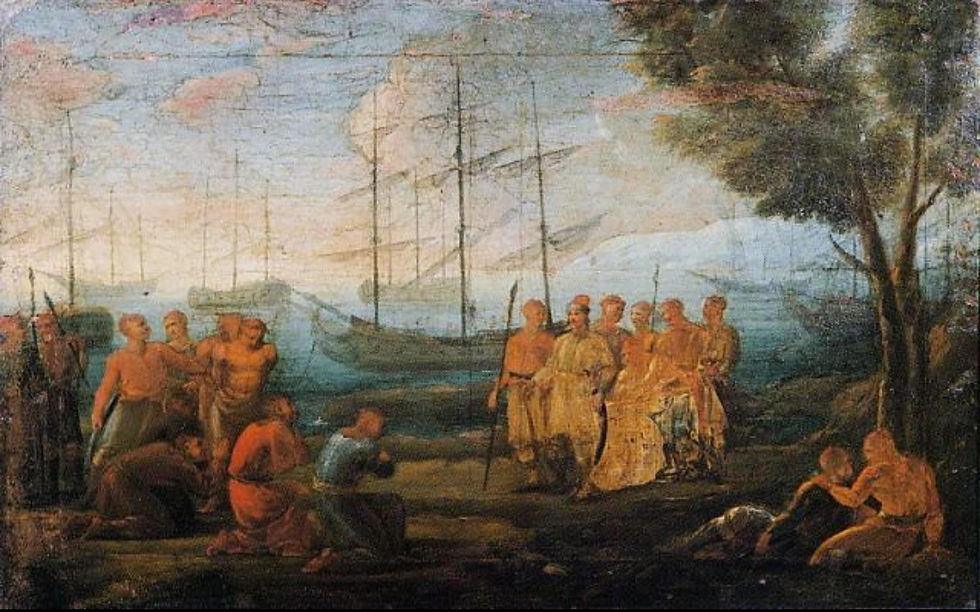D - 4: Habemus Papam?
- hbanziger
- Jul 10, 2020
- 4 min read
Updated: Mar 26, 2021
In the blog about usury, we talked about the Council of Niceae in 325 AD, which unified Christian doctrine and decided which books form the new testament and which ones were excluded. It also stipulated who of the Patriarchs were responsible for which areas. The Patriarch of Alexandria for Egypt and Afrika, the Patriarch of Antioch for the Middle East and the Bishop of Rome for Italy. The title Patriarch and Pope were used interchangeably and still are today. The Patriarch of the Coptic Church in Egypt is sometimes called the Pope of Egypt. Catholic Bishops sometimes Patriarchs. The Patriarch of Constantinople, the head of the Orthodox Church in Eastern Europe and Greece never assumed the title Pope.

Orthodox painting of the Council of Niceae with Emperor Constantine at the center flanked by the Patriarchs of Alexandria, Constantinople, Antioch and Rome in 325 AD
The Pope however claims to be the deputy of God and the first Patriarch. Not even the first amongst equals. How did this happen? The position of pope does not exist in the bible nor was there an Imperial decree that created it. Very peculiar – the claim is actually based on notes from the very same Council of Niceae. But as a Protestant, I can see no support for the papal claim in the words quoted. It is no surprise then that Coptic, Orthodox and Protestant church all object. If ever a vote had been taken, the Pope would find himself in a minority position. How very intersting.

Europe 800 AD when Charlemagne was crowned Holy Roman Emperor of German Nations
A look outside the box gives us a new perspective. In 800 AD, the Byzantine Empire, the leading Christian nation, where the Patriarch of Constantinople was appointed by the Emperor, was in a difficult situation. Threatened by Arab attacks from the east and Bulgars from the north, it was only able to defend its core territory. Sicily, Sardinia and Corsica were already lost to Arab raiders, Calabria and Pulgia were under sever threat. Also, due to dynastic strive, Irene of Athens, the wife of Leo IV, became sole ruler and first female Empress from 797 to. 802. And with this she became the head of the Christian Church – something the all-male clergy found difficult to digest - a woman at the top of the Church!
The threat of Arab forces just 100 km to the west of the Italian mainland and the inability of the Byzantine Empress to come to his help forced the Pope to reconsider his strategic options. For 324 years, no German king had dared to claim the title of Roman Emperor. By offering it to the Lord of the Franks, the Pope could recruit the most powerful warrior in Western Europe to his defence. The plan was hatched to offer Charlemagne the title and ask him with to liberate Corsica from the Arab invaders. The map above shows the island already as Frankish possession – it was something Charlemagne actually had to fight for. The Imperial title had not only high symbolic value, it also helped Charlemagne to consolidate his young empire. As Emperor, he could accept kings as subordinates. As Emperor he was the King of Kings. Of course, the argument was used that no woman could be head of church. Wasn’t Jesus a man? But it was dishonest. Once Pope Leo III had crowned Charlemagne, he considered himself to be the head of church and not the Emperor. Through his authority as God’s deputy he had put the crown on Charlemagne’s head. Who crowns must be superior to the crownee. Logic, isn’t it?

Coronation of Charlemagne on Christmas Day in 800 AD by Pope Leo III
Leo III had other reasons to be secure Charlemagne's loyalty. The Allies of his predecessor, Adrian I, thought that the new pope was unfit for office and accused him of adultery and perjury. Already before the coronation, Charlemagne had to intervene in his favor and protect him against an assassination attempt. On the day before the coronation, Pope Leo III took an oath of purgation and his opponents were exiled. The deal was sealed.
We now had a Pope who could crown emperors and an emperor who could protect a pope. What a perfect symbiosis. With this coup, Leo III had established himself as God’s deputy who had no rivals and Charlemagne resurrected the tradition of the Roman Empire in the West. We have a pope – “Habemus Papam!” pronounces the conclave of cardinals after the election of a new pope. Wonder whether anybody said this at the coronation of Charlemagne. There is no Emperor of the Holy Roman Empire anymore. But we got a pope and still have him.

The clever Pope Leo III (795 – 816AD)
The role of the Popes in Mediterranean history is not to be underestimated. With 10% of all church revenue at their disposal and the power to excommunicate, they were powerful players in European politics. Without them, there would not have been crusades and no Holy League to check the advance of the Ottoman Empire. They were never just spiritual leaders - they were secular rulers at the same time.







Comments